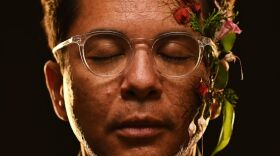Ben Barnes has seen the other side. No, not just the back of a movie camera or the inside of a Netflix fantasy set, but the worn-down, sleep-deprived, sweat-soaked trenches of a real tour bus, complete with a band of "fellow pirates" and the kind of wonder that only comes from waking up in a different city with no idea what day it is. "It was both more grueling and testing in certain ways than I thought," Barnes says, smiling like someone who survived it. "But also so, so much more thrilling and fulfilling."
This wasn’t some actor-on-a-vanity-project road trip. This was Barnes finally living out the rock and roll dream that started with watching Almost Famous on loop, only to discover that, yeah, the romance is there, but so is the airport death march at the end. "The last show we played at the Wiltern just felt like kind of a dream," he says, eyes somewhere between the Wiltern and Neverland. The dream apparently included handwritten notes from his band saying the tour changed their lives. "If there has ever been a measure of success," he shrugs, "you don't need a billion streams."
But let’s rewind. Because Barnes isn’t new to music. Before the cloaks, the swords, and the morally grey TV roles, there was always music. "I played this desperate musician in Killing Bono years ago," he recalls, "and I met my drummer Hammy on that set." Fast forward to now, and Hammy’s not just hitting snares—he’s Barnes' music manager. Life imitates art, or at least helps pay for the bus.
"When I started this tour, I couldn’t believe how nervous I was," Barnes admits. "By the end, I felt like I belonged on those stages." But not as some actor moonlighting in front of a mic. He wanted to be real. No freak show. No sideshow attraction. Just a guy with a soul record and the guts to play it.
And yes, it’s soul music. That part surprises people. "Before I'd heard anything, I didn’t expect that sound," I tell him. He nods, already familiar with the typecast. "You’ve played the bad side of things for a while," I say. He grins, fully aware of the shadow he's walked in on screen. But on record? It’s all Stevie Wonder, Donny Hathaway, Elton John, with a little Dickens thrown in for good measure. "It comes out of the tumble dryer sounding like something else," he laughs.
Literature runs deep in this one. “My English lit brain insists on it,” he says, casually dropping Dylan Thomas into a lyric and wondering if he’s the only one Googling his own choruses to make sure they aren’t accidental rip-offs. “Every time I sing 'I couldn’t love you into loving me', I almost want to stop the show and Google it again,” he confesses. Spoiler: it’s his.
The debut album, Where The Light Gets In, isn’t just some loose collection of actor-flavored ballads. It’s a messy, deliberate journey through the stages of a relationship—lust, heartbreak, nostalgia, and the kind of cautious hope that might make Ferris Bueller proud. “I didn’t want to leave out any aspect,” he says, equal parts proud and obsessive. “I want to rid myself of any anxious feeling by knowing I did the thing and left nothing on the table.”
Of course, now comes the trade-off. With a tour behind him and the album out in the world, Barnes has to shelve the soul man and become someone else. Again. His day job as an actor calls, and this time, it's a Stephen King adaptation, The Institute. "I’ve played a lot of villains," he says, almost apologetic. "So to play a man with a decent moral compass is a nice shift." Getting into character isn’t all method gloom either. Sometimes it’s music. Specifically, Nicholas Britell’s "Agape" from If Beale Street Could Talk. “That song just sounded like the character,” he says, half-lost in the memory. “I’d walk down the street with it in my ear to remind myself.”
So what now? More acting? More music? Probably both, with some cross-referencing in between. Because for Ben Barnes, it’s never just one thing. "I'm the guy who looks at the album and thinks, 'I don't have a song looking forward,'" he laughs, self-aware and not trying to pretend otherwise. "That's part of my stream of consciousness too."
And really, who needs to sell out the Hollywood Bowl when you’ve already played Shepherd’s Bush Empire, held cutout hearts from Oslo fans, and survived the road like it was written by Cameron Crowe?
Watch the full interview above and then check out the track below.






